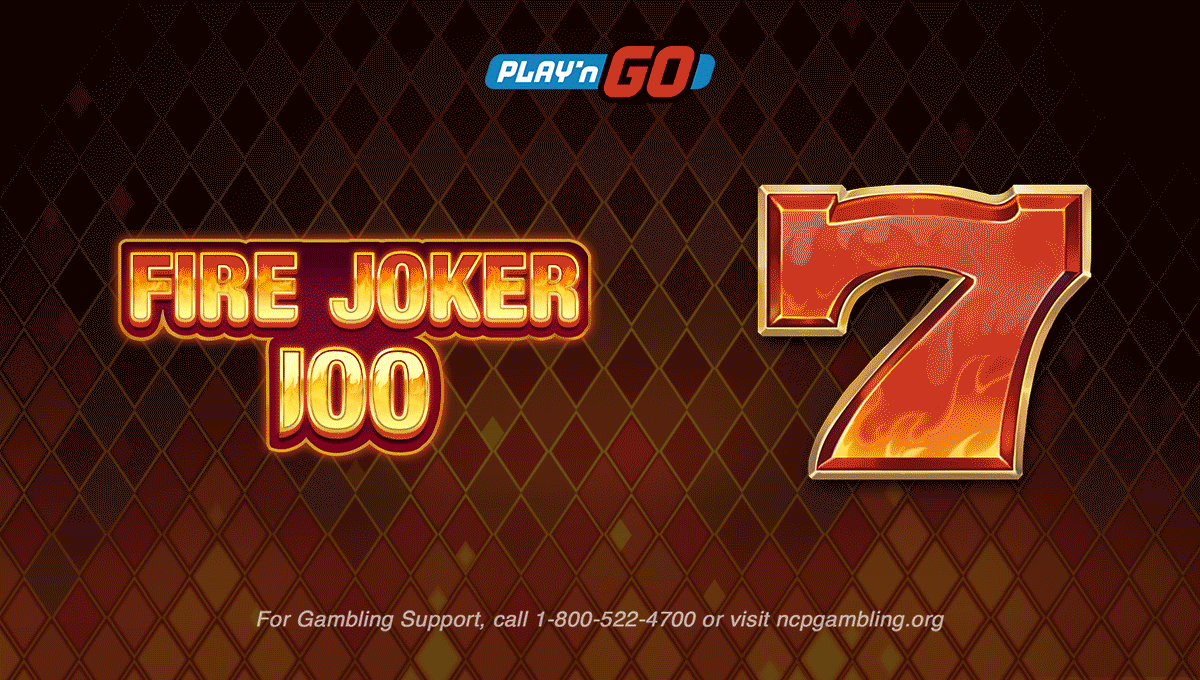Latest News
College Partnerships Under Scrutiny: The Future of Campus Gambling Deals – Compliance, Alternatives, PR Risk
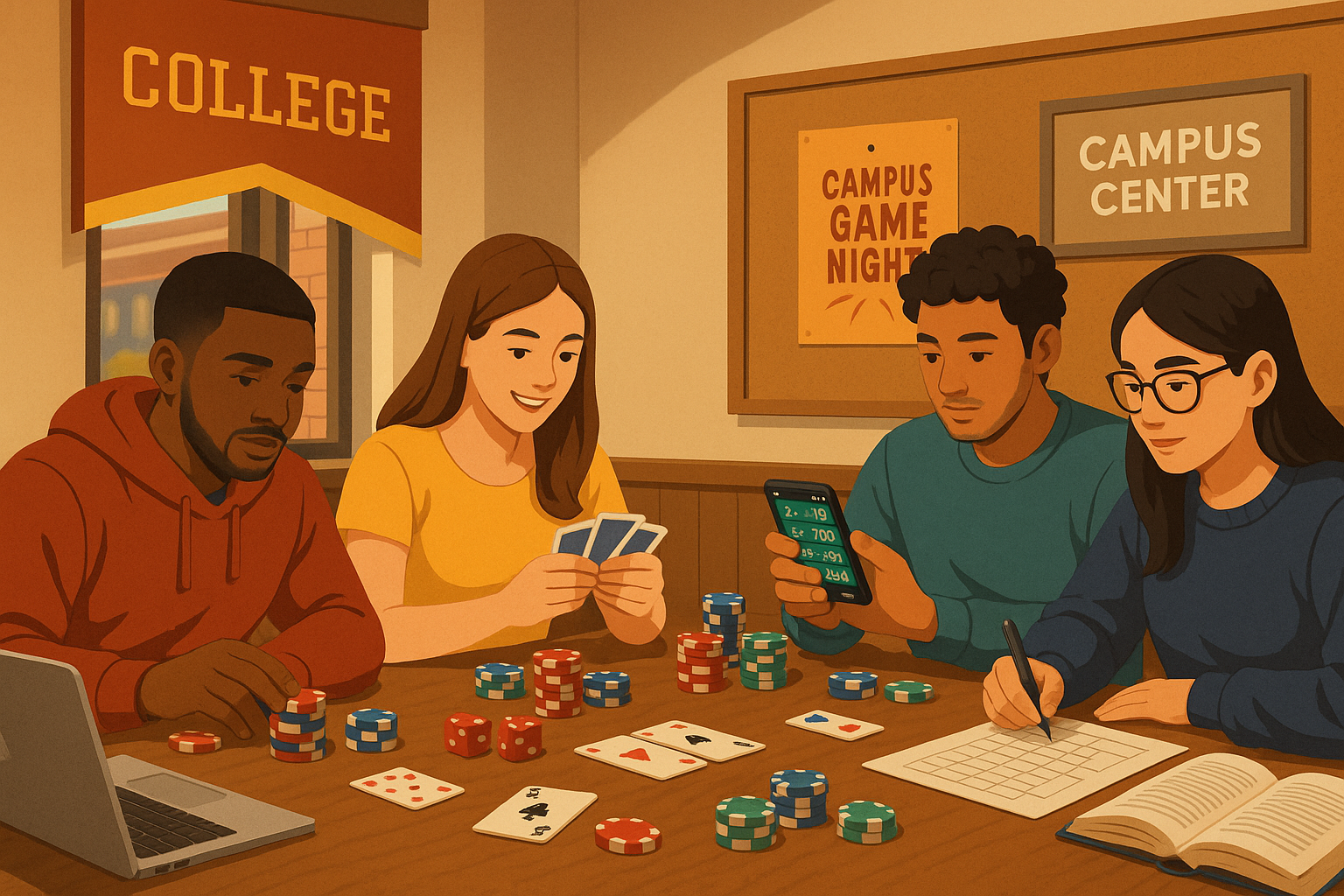
The era of splashy sportsbook logos wrapped around student sections is fading fast, and for good reason. What looked like an easy revenue win after the expansion of legal sports betting now sits at the intersection of compliance complexities, reputational hazards, and evolving cultural expectations about how gambling interacts with college life. Universities are recalibrating their risk tolerance, athletic departments are revisiting sponsorship inventories, and operators are rethinking whether campus-facing marketing is worth the blowback. At Gambling Freedom Casino and News Portal, weâve seen the conversation shift from âHow big can this get?â to âHow do we do this responsibly,or not at all?â The answer is not a simple yes or no; itâs a recognition that the future of campus gambling deals will be smaller, more carefully segmented, and anchored in integrity and harm minimization. That future rewards institutions and brands that can communicate clearly, document compliance rigorously, and operate with a âhelp-first, hype-laterâ mindset.
From a compliance standpoint, the baseline in 2025 is tighter than many casual observers realize. Industry marketing standards increasingly discourage promotions that could be perceived as targeting students, and the phraseology once common in acquisition campaigns is now off-limits or strongly discouraged. In parallel, more state regulators are scrutinizing college markets, especially player-specific proposition bets, on the grounds that they heighten the risk of harassment and integrity issues. The NCAA has spent the last few seasons pushing for stronger athlete protections and a more consistent compliance posture across jurisdictions. Put all of that together and the practical effect is clear: even if a category is technically legal in one state, the patchwork of rules, guidance, and best practices makes campus-facing deals a compliance headache and a reputational gamble. The safest route is to build partnerships that avoid student channels, exclude conversion-driven creative around college events, and lean into education, integrity, and alumni engagement where age gating and segmentation are both meaningful and auditable.
Reputational risk is the other half of the equation and itâs often underestimated until it isnât. The optics of a sportsbook brand appearing inside a campus venue or in an email blast that lands in student inboxes can overshadow months of careful planning. In the digital age, a single misguided subject line or banner placement can live forever in screenshots, resurfacing whenever a university confronts unrelated controversies. For athletic departments, the blowback doesnât just come from national media; local stakeholders, faculty governance, and alumni donors have strong opinions about how a schoolâs brand is used. The narrative can turn quickly: what a marketing team frames as âsupporting athleticsâ can be framed by critics as âmonetizing student attention with gambling.â Add the human dimensionâstudents and athletes facing social media pressure tied to bets and the reputational calculus tilts further away from broad-based campus advertising. Once a school becomes the example cited in op-eds and parent forums, every future sponsorship meeting starts on defense, which is a tremendous tax on leadership attention and goodwill.
So where does that leave universities and sportsbooks that still want to collaborate responsibly? The first lane is alumni-only engagement that lives firmly outside student media. Think association newsletters sent to verified recipients, event activations tied to homecoming for over-21 alumni, and gated digital experiences where age verification and alumni status are both required. The operative phrase is segmentation with proof: CRM hygiene that suppresses any .edu domains associated with enrolled students, third-party age checks that withstand audit, and creative that emphasizes responsible play rather than acquisition gimmicks. It is equally important to leave campus-owned assets out of the plan entirely: no student newspaper, no student radio, no in-venue signage within sightlines dominated by under-21 attendees, and no .edu pages. Success here is measured by quiet compliance, not splashy vanity metrics. Campaign briefs should spell out what will not be done (no first-bet language, no odds boosts tied to school IP, no promo codes keyed to team names), and media buys should be geofenced and frequency-capped to avoid spillover impressions.
The second lane is integrity and data cooperation, which is fundamentally different from marketing. Rather than converting users, these partnerships focus on protecting competitions and people. Universities and operators can align around standardized reporting protocols for suspicious activity, training modules for staff and athletes that explain wagering rules and red flags, and secure data exchanges that support real-time anomaly detection. When structured correctly, integrity agreements do not place sportsbook logos on campus; they establish clear lines of responsibility, define escalation paths if something looks off, and include audit rights to ensure both sides are living up to the agreement. Forward-thinking athletic departments are building dashboards that track integrity KRIs (key risk indicators) across seasons, and operators are assigning compliance liaisons who can respond quickly to questions about markets, limits, and emerging risks. A valuable signal of sincerity is a proactive stance on contentious markets: choosing not to market college player props or removing them from any alumni-facing creative, sends a message that athlete wellbeing matters more than marginal handle.
A third lane is responsible-gambling (RG) education and independent research, an area where universities can lead with credibility if the funding and governance are set up correctly. The rule of thumb is âhelp, not hype.â Programming should elevate helplines and support resources, teach students and staff how to recognize early warning signs, and outline practical steps for friends or teammates who are worried about someoneâs gambling. Workshops can be built for specific audiences, athletes, coaches, RAs, student leaders – with content tailored to situations theyâll likely encounter, like managing group chats during big games or dealing with harassment tied to a missed free throw. If an operator helps fund this work, the branding should be deliberately muted and the calls to action should point to counseling resources, not betting apps. On the research side, schools can host longitudinal studies on gambling behaviors and mental health that inform policy decisions across states. The key is independence: academic freedom, publication rights, and data privacy are non-negotiable. When these programs release annual reports with outcomes numbers trained, referrals made, satisfaction and knowledge retention scores, they earn trust with regulators and the public.
Embedding all of the above in real governance requires contracts and processes that are as rigorous as anything in broadcast rights or apparel. Agreements should explicitly exclude student-facing channels and campus IP in promotional contexts, require preclearance of all creative, and mandate third-party age and identity checks for any alumni lists used in marketing. Internal workflows matter just as much: establish a cross-functional signoff path that includes compliance, legal, athletics communications, the alumni office, and student affairs; maintain a living registry of all placements; and document every exception request and rejection. A quarterly audit, conducted by an independent partner, should test suppression lists, confirm geo and age parameters, and sample creatives for prohibited phrasing. Crisis preparedness is part of the job: have templates ready for misdirected emails, rogue social posts, and policy changes that force offer adjustments mid-season. Run tabletop exercises with leaders so everyone knows who approves the statement, who pauses the media, who contacts the vendor, and who answers reporter questions. The smoothest crises are the ones that never become public because the response is instant and well-rehearsed.
Looking ahead, the most realistic forecast is a smaller, safer lane for collegeâoperator collaboration. Expect states and conferences to continue refining rules around bet types and advertising, particularly where athlete wellbeing and harassment are implicated. Expect universities to sunset remaining campus-facing placements in favor of alumni-only channels that leave a clean paper trail, lowering both compliance risk and noise around brand stewardship. Expect the integrity conversation to mature, with more standardized data formats, quicker reciprocity on investigations, and better education for the non-athlete campus community, resident advisors, counseling centers, and compliance staff who are often the first to notice when something is off. And expect that schools which articulate a clear philosophy- âWe protect students, we protect athletes, we promote help-seeking, and we partner only where age-gated, auditable outcomes existâ, will spend less time in reactive posture and more time telling a positive story about values.
For operators, the business case is quiet credibility. Instead of chasing a fleeting burst of signups tied to a rivalry game, smart brands will invest in long-term reputation: integrity agreements that make competitions safer, alumni engagements that demonstrate real respect for age limits and context, and RG programs that exist to serve the community rather than acquire customers. That approach doesnât just avoid headlines, it earns allies. Alumni who see careful, adult-only engagement are less likely to bristle at a brandâs presence. Regulators who see documented controls and public reporting are less likely to question motives. University leaders who see proof of restraint are more open to renewing low-risk collaborations. In other words, the playbook that Gambling Freedom recommends is not âdo nothing,â but âdo the right things, in the right places, for the right reasons.â
The final takeaway is simple: campus gambling deals are no longer a volume game; they are a values game. If your plan cannot be explained in a sentence that starts with student safety, athlete wellbeing, and competition integrity, itâs probably the wrong plan. If your KPIs are built around alumni engagement quality, RG outcomes, and zero incidentsânot just clicks and codes, youâre on the right track. And if your processes assume that everything might one day be scrutinized by parents, faculty, alumni, and policymakers, you will build the sort of resilient partnership that can survive news cycles and leadership changes. Gambling Freedom exists to help universities and sportsbooks navigate precisely this terrain, compliance-conscious, PR-smart, and responsibility-first – so that whoever partners on college sports can do so with confidence, clarity, and respect for the communities they serve.
Gambling in the USA
TCSJOHNHUXLEY to Sponsor Inaugural G2E Dealer Championship

G2E Las Vegas 2025 is set to host the first-ever US Dealer Championship, and TCSJOHNHUXLEY is delighted to announce its sponsorship of this landmark event. The championship, which celebrates the skill and professionalism of casino dealers, will take place at The Venetian Expo from October 7-9, 2025.
The G2E Dealer Championship will bring together the nation’s top casino dealers to compete for the title of “Best Dealer.” Contestants will be judged on their technical precision, game knowledge, and ability to provide a superior player experience.
As a proud sponsor TCSJOHNHUXLEY will be supplying all the Roulette tables for the competition, ensuring the highest standard of equipment for the championship. This not only highlights the companyâs commitment to the dealers but also provides the perfect platform to showcase its renowned manufacturing expertise. TCSJOHNHUXLEYâs world-class Roulette tables are testament to the precision engineering and superior craftsmanship that has set the industry standard for decades.
Phil Lee, TCSJOHNHUXLEY Chief Financial Officer & Managing Director Americas comments, “We are delighted to be a part of the first G2E Dealer Championship, an event that truly celebrates the invaluable role of casino dealers. Dealers are the heart of the live gaming experience, and we are committed to supporting their success. Our outstanding Roulette tables will provide the perfect platform for these talented professionals to showcase their artistry and skill.”
The G2E Dealer Championship will take place at Booth #5225, located in The Strip at G2E.
The sponsorship underscores TCSJOHNHUXLEY’s unwavering commitment to the live gaming sector and the professionals who drive its success. The company invites all attendees to witness the championship and visit its stand at Booth #4439 during the expo to see its full range of innovative solutions.
Compliance Updates
ThrillTech secures regulatory approvals to launch jackpots in Latam
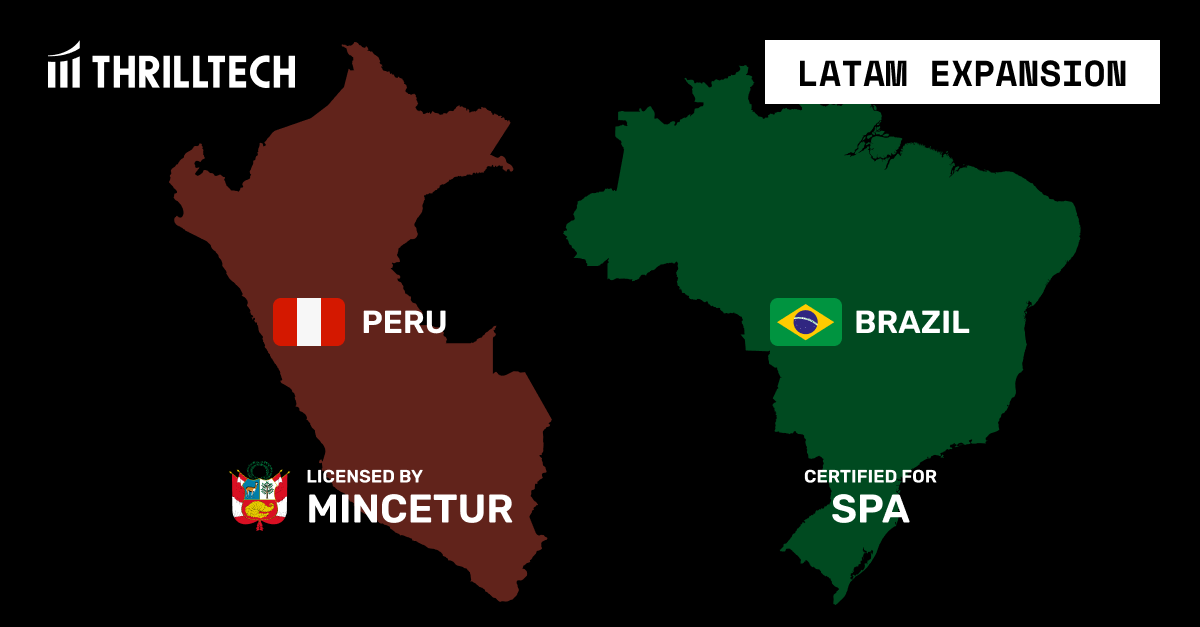
Peru and Brazil to provide launchpad for Latam expansion as ThrillTech strengthens presence in emerging regulated markets
ThrillTech, the B2B jackpot specialist, has taken a significant step forward in its international growth strategy after securing a B2B licence in Peru and regulatory certification in Brazil.
The approvals clear the path for ThrillTech to launch its proprietary player-funded jackpot solutions in Latin America for the first time, bringing its flagship ThrillPots product to one of the worldâs most exciting and emerging regions for iGaming.
Latin America has become a focal point for operators in recent years, with Brazilâs market liberalisation and Peruâs structured regulatory framework, as set out by the countryâs ministry of foreign trade and tourism (MINCETUR), providing fertile ground for innovative engagement tools.
By working tirelessly to secure entry into both countries, ThrillTech is positioning itself to support operators with compliant, performance-driven jackpot mechanics that can drive revenue and enhance retention.
Peter Mares, CTO and co-founder of ThrillTech, said: âExpanding into Latin America is a milestone moment for us. The region is bursting with opportunity, but it also demands solutions that are flexible, transparent, and built to scale. With a licence in Peru and certification in Brazil, we are ready to deliver the same measurable revenue impact to operators in Latam that weâve already proven in Europe.
ThrillTechâs products are designed to provide operators with new revenue streams through side-bet jackpots, while also offering real-time engagement mechanics via cash-only rewards.
Already integrated with multiple tier-one operators in Europe, ThrillTech is now primed to replicate that success in Latam by delivering regulator-approved solutions to local operators.
Latest News
Inspired Extends Brazil Presence with EstrelaBet Partnership

Inspired Entertainment, Inc., a leading provider of B2B gaming content, systems, and solutions, has expanded its presence in Brazil through a newly launched partnership with EstrelaBet, a leading Brazilian gaming tech company. The collaboration brings Inspiredâs acclaimed portfolio of iGaming titles to EstrelaBetâs growing player base, further demonstrating the Companyâs commitment to the regionâs gaming industry.
Through integration facilitated by Softswiss, EstrelaBet players in Brazil will now have access to a wide selection of Inspiredâs top-performing online and mobile slot titles, including localized versions of global hits such as Big Fishing Fortune⢠(Super Pescaria da Fortuna), Golden Winner⢠(CampeĂŁo de Ouro), Cops ânâ Robbers Bigger Big Money⢠(PolĂcia e LadrĂŁo Bolada), Centurion Big Money⢠(Centurion Muita Grana), among others. The rollout will also include regular new content releases, offering a balance of fan-favourite classics, innovative mechanics, and seasonal experiences designed to maximize player engagement and retention.
Claire Osborne, Vice President of Interactive at Inspired Entertainment, said: âWeâre thrilled to partner with EstrelaBet to bring our diverse portfolio of fun games to Brazilian players. From proven hits to innovative seasonal content, our titles are designed to entertain, captivate, and perform. This partnership marks another important step in expanding Inspiredâs reach in one of the worldâs most exciting and fast-growing iGaming markets.â
Fellipe Fraga, Chief Business Officer at EstrelaBet, added: âThis collaboration positions EstrelaBet at the forefront of the Brazilian iGaming sector by offering our players access to some of the most recognized and entertaining slots content available. Inspiredâs reputation for quality and variety makes them an ideal partner, and we look forward to delivering their games to our growing audiences across Brazil.â
With localized branding, strong thematic appeal, and a track record of high performance across regulated markets, Inspiredâs iGaming content is well positioned to captivate Brazilâs rapidly expanding online player base while delivering added value to operators.
-

 Gaming7 days ago
Gaming7 days agoMonster Energy and Call of Duty Unite Again with Exclusive In-Game Rewards and Expanded Program Timing
-

 Canada6 days ago
Canada6 days agoabsolutebet Secures AGCO Registration as an Internet Gaming Operator in Ontario
-
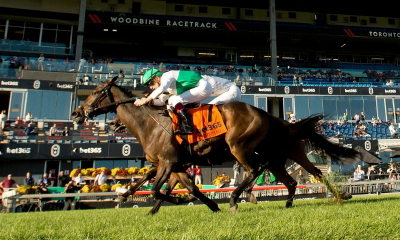
 Latest News7 days ago
Latest News7 days agoWoodbine partners with 1/ST for Pegasus World Cup Filly & Mare Turf Qualifier
-

 Latest News7 days ago
Latest News7 days agoPlaza Hotel & Casino Partners with Aristocrat Gaming⢠debuts Downtownâs First Buffalo & Moâ Friends⢠Slot Area Ribbon cutting event and launch of player promotion: Thursday, Sept. 4, 11 a.m
-
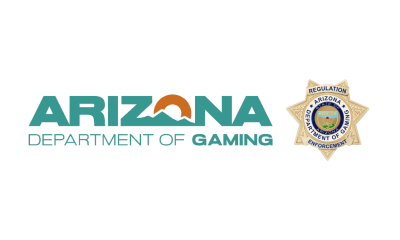
 Latest News6 days ago
Latest News6 days agoArizona Department of Gaming and Arizona Lottery Announce Proclamation Recognizing September 2025 as Responsible Gaming Education Month
-

 Industry News7 days ago
Industry News7 days agoStatRankings Launches with Aim to Deliver Faster, Cleaner, and Smarter Sports Data Experience
-

 Daily Fantasy Sports7 days ago
Daily Fantasy Sports7 days agoBetr Kicks Off NFL Season with Revamped Betr Picks, Industry-highest 10,000x Payouts, Free $10 Play, and the Launch of Betr Arcade
-

 Latest News7 days ago
Latest News7 days agoInternet Sports International (ISI) Launches ISI Mobile, a Best-in-Class Gaming Software Solution


